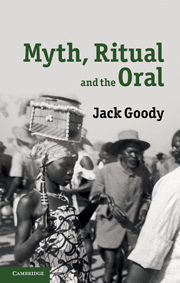Book contents
- Frontmatter
- Contents
- Acknowledgements
- Introduction
- 1 Religion and ritual from Tylor to Parsons: the definitional problem
- 2 Oral ‘literature’
- 3 The anthropologist and the audio recorder
- 4 Oral creativity
- 5 The folktale and cultural history
- 6 Animals, humans and gods in northern Ghana
- 7 The Bagre in all its variety
- 8 From oral to written: an anthropological breakthrough in storytelling
- 9 Writing and oral memory: the importance of the ‘lecto-oral’
- Appendix Folktales in northern Ghana
- References
- Index
3 - The anthropologist and the audio recorder
Published online by Cambridge University Press: 05 June 2012
- Frontmatter
- Contents
- Acknowledgements
- Introduction
- 1 Religion and ritual from Tylor to Parsons: the definitional problem
- 2 Oral ‘literature’
- 3 The anthropologist and the audio recorder
- 4 Oral creativity
- 5 The folktale and cultural history
- 6 Animals, humans and gods in northern Ghana
- 7 The Bagre in all its variety
- 8 From oral to written: an anthropological breakthrough in storytelling
- 9 Writing and oral memory: the importance of the ‘lecto-oral’
- Appendix Folktales in northern Ghana
- References
- Index
Summary
Chapters 3 and 4 were published in France, the first in Régis Debray's journal, Médium, transmettre pour innover, in 2005, the second contribution was for a conference in Paris. In the first I discuss the role of the audio recorder for the anthropologist. This was critical to me personally and theoretically. Acquiring an early Philips machine in the field, after my original stay among the LoDagaa, meant that I could now record speech in recitation in a manner no one before had been able to do in ‘primitive’ situations. Not only could one now record in the actual context of performance, instead of having to take an ‘informant’ into one's hut, but also one had the opportunity to review the actual recitation at leisure. That was already something. For when one asked an ‘informant’ to recite, he was more likely to give you what you wanted to hear (the narrative bits, for example, leaving out the philosophical ones). But from my point of view what was most important was that, as distinct from working with pencil and paper in a field situation, one could now record with relative ease a plurality of versions of a single recitation. That was important because, in the case of the Bagre, these showed considerable variation, whereas if I believed the actors themselves, every version was the same (that is, in the same ritual).
- Type
- Chapter
- Information
- Myth, Ritual and the Oral , pp. 58 - 63Publisher: Cambridge University PressPrint publication year: 2010



